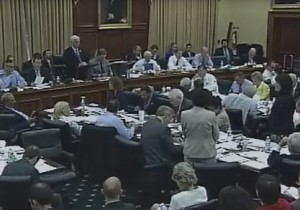
Full Appropriations Committee Yesterday, July 31
In mid-July, the appropriations subcommittee that oversees funding for the National Endowment for the Arts (NEA) met to approve a funding bill for fiscal year 2014, which begins on October 1st. Their bill calls for the NEA to receive a 49% cut totaling $71 million, which would bring the agency’s budget down to $75 million, a level not seen since 1974!
Yesterday, the full appropriations committee began their consideration of the bill, expected to take a few hours. However, they faced numerous amendments and rising tempers, and everyone has had an eye on adjourning for August – so they suspended the committee markup until September.
Before they stopped, they did consider an amendment offered by senior appropriator Rep. Nita Lowey (D-NY) and Rep. David Price (D-NC) to fund the NEA (and the National Endowment for the Humanities) to the president’s request of $154 million. The amendment was defeated along a party-line vote of 19-27.
The 49% budget cut that remains in place is shocking, but not necessarily surprising. Leading up to the committee’s action, the House of Representatives approved a budget resolution which included the sequester cuts of about 5% to agency budgets, and an overall funding plan that reduced the entire bill by 19%. So, arts advocates and those who were closely watching from the environmental and natural resource communities were not surprised to see significant cuts proposed. However, a 49% reduction to an independent federal agency is misguided, counterproductive, and entirely disproportionate.
|
Final FY 2013
(includes 5% sequester cut)
|
FY 2014 President's
Request
|
FY 2014 House Subcommittee
Proposal
|
|
National Endowment for the Arts
|
$138.4
million
|
$154.466 million
|
$75
million
|
|
National Endowment for the Humanities
|
$138.4
million
|
$154.466 million
|
$75
million
|
The arts community recognizes the challenges our elected leaders face in prioritizing federal resources. In fact, funding for the NEA has already been cut by more than $29 million over the past three years. These disproportionate cuts recall the dramatic decline of federal funding for the arts in the early 90s, from which the agency has still not recovered.
Read More










 Nina Ozlu Tunceli
Nina Ozlu Tunceli




